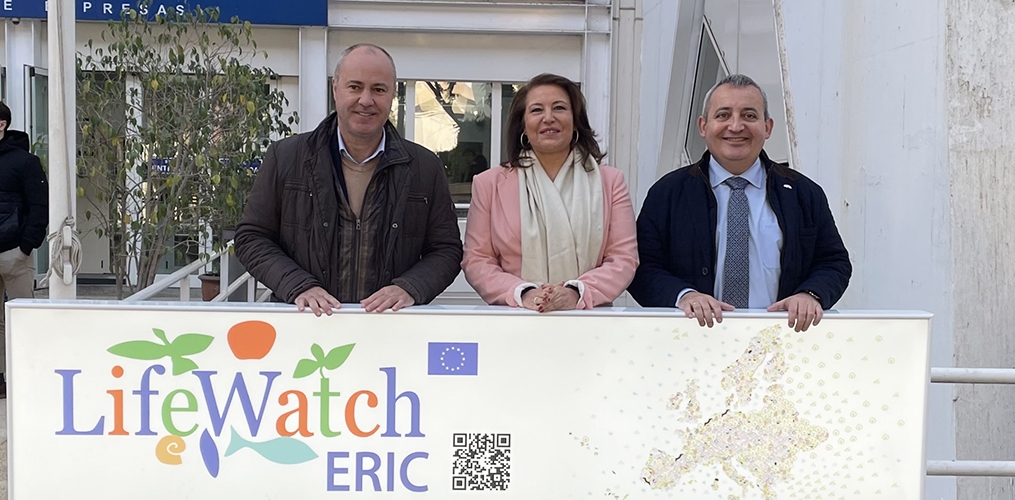
The Councillor for Agriculture, Fisheries, Water and Rural Development of the Junta de Andalucía, Carmen Crespo, was welcomed to LifeWatch ERIC’s ICT-Core office in Seville yesterday, accompanied by the director of the Andalusian Agricultural and Fisheries Management Agency (AGAPA), José Carlos Álvarez, to discuss trailblazing agroecology initiatives which will have wide-ranging impacts. 2023 is an exciting year for LifeWatch ERIC, as it gains traction in the EU research and innovation sector.
LifeWatch ERIC has a strong historic collaboration with the Junta de Andalucía, one such synergy being with the AGAPA on the ERDF SmartFood project, for which a nanosatellite equipped with a very high resolution multispectral camera will be launched in October this year from a Space X base in the United States. The aim of the SmartFood project is to monitor the impact of agriculture, livestock and fishing on the sustainable management of biodiversity and ecosystems – LifeWatch ERIC has the technological lead here, and is creating the nanosatellite mission control centre “eBRIC” (eBiodiversity Research & Innovation International Centre) in the Doñana National Park, in partnership with the University of Huelva. Among other things, the centre will focus on interconnected sensorisation at the terrestrial, atmospheric (observation stations, drones) and spatial level (satellites); the study of invasive species; aquifer conservation; native flora and fauna protection; and virtual laboratories for scientific research in the Cloud, using ICT such as Big Data, Artificial-Deep Intelligence “Deep Learning”, and especially Blockchain, through the LifeWatch ERIC LifeBlock tool. The infrastructure conceives the e-BRIC as an international reference centre for Europe, Africa, and Latin America and the Caribbean, aligned with the United Nations through the UNOOSA Office for Biodiversity and Climate Change.
Crespo also congratulated the infrastructure on being chosen to play a key technological role in the AELLRI EU Partnership initiative proposed by the European Commission, as part of the Horizon Europe topic provisionally entitled “Accelerating farming systems transition: agroecology living labs and research infrastructures”, to pioneer the EU’s agricultural transition towards sustainable agroecological models. She highlighted “the importance of the research work carried out by Lifewatch ERIC, offering important data that allows better decisions to be made in the pursuit of sustainable agriculture and preserving biodiversity”, citing how these technological innovations will support Andalusia in reaching and maintaining EU ecological agricultural objectives, both on land and at sea.
CTO Juan Miguel González-Aranda underlined the importance of the agricultural, fishing and livestock sector within the green and blue development paradigms, in coordination with the Green Deal and Blue Growth policies of the EU, and expressed his gratitude for the institutional support, especially from the Ministry of Agriculture, pointing out that “biodiversity cannot turn its back on the primary sector, which is so important for the Autonomous Community of Andalusia”.